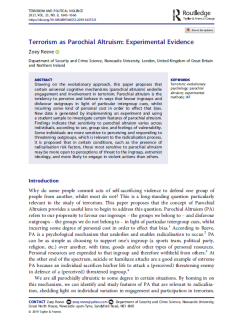This psychological research finds some individuals are more sensitive to perceiving and responding to threatening outgroups, which is relevant to the radicalization process. It is proposed that in certain conditions, such as the presence of radicalization risk factors, those most sensitive to parochial altruism (PA) may be more open to perceptions of threat to the ingroup, extremist ideology, and more likely to engage in violent actions than others. They did not find differences between men and women in their study regarding PA towards ingroups and outgroups. They also didn’t find gender differences regarding behavioral ingroup bias (as in affiliation or “love for”) and propose that push factors are more influential than pull factors. Where gender difference did appear was in “coalitional parochial altruism” (CPA) where men were more likely to engage in CPA than women, as were those who were extrinsically religious. This finding supports other research which suggests male engagement in terrorism can be understood on the basis of status threat and/or gain even where the bias towards the wider ingroup is missing. “Warrior” males are more sensitive to PA and responsive to it in coalitions than women, making them potentially more vulnerable to perceptions of threatening outgroups, and coalitional features of radicalisation (i.e. bonding, training, belongingness in small groups). Coalitional activities like rituals, further increase sensitivity to parochial altruism.

2021